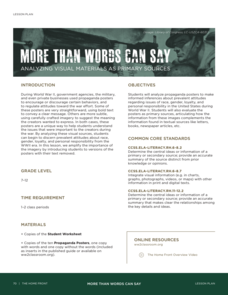Curated OER
Planets Curriculum
Students complete an in-depth study of the known planets in the solar system. As a class, students identify the planets that are known in the universe, in the night sky. They explain the differences between planets and stars and the...
Curated OER
Stellar Lunar Curriculum
Young scholars engage in a lesson that covers the concept of different phases of the moon. They name the cycles of the phases of the moon while using flashlights to simulate the light of the sun. They research information about several...
National WWII Museum
More Than Words Can Say: Analyzing Visual Materials as Primary Sources
The propaganda of World War II was a key factor in galvanizing the home front. Class members examine images—without their text—to consider their messages, including those around race and gender. Using pictures and discussion questions,...
Anti-Defamation League
The Name Jar: Discussion Guide for Grades Pre-K–1
A lesson spotlights the story, The Name Jar, by Yangsook Choi. After a read-aloud, the class retells the story using puppets or dress-up. They participate in a thoughtful discussion about the story, answer questions relating the...
Curated OER
Folktales of Zora Neale Hurston
Do you know why woodpeckers have red heads? Why the possum has no hair on its tail? Why a cat has nine lives? Find out by downloading this resource that uses Zora Neale Hurston's collection Mules and Men as the basis of a study of...
Texas Center for Learning Disabilities
Second and Third Grade Explicit Phonics Intervention
Support all young learners on their journey to literacy with this five-lesson reading intervention unit. Following a clearly outlined format, each lesson first engages children in practicing their phonemic awareness and phonics...
School Improvement in Maryland
Dividing the Powers of Government
Who does what? To develop an understanding of the balance of power between the US federal and state governments, class members research responsibilities in terms of legal systems, security issues, economic activities, lawmaking, and...
School Improvement in Maryland
Building a Pyramid
After reviewing the structure and powers of the three branches of the US government, groups investigate a problem and research what is being done to address this criticism.
School Improvement in Maryland
Affirmative Action
Do the government's affirmative action policies promote equity in the United States? The Fourteenth Amendment to the US Constitution and affirmative action policies come under scrutiny in an activity that asks class members to...
School Improvement in Maryland
Evaluating Political Advertisements
How do interest groups try to influence elections? As part of their study of the election process, groups view 30-second advertisements produced by advocacy groups and use the provided worksheet to evaluate these ads. They then craft...
School Improvement in Maryland
Analysis of Marbury v. Madison
Should the United States Supreme Court have the power of judicial review? Instructors guide class members through a review of Marbury v. Madison and assist class members in writing a brief of the case. As independent practice,...
School Improvement in Maryland
Immigration Legislation
What is the purpose of immigration legislation? How has this legislation evolved over the years? What are the factors that caused these changes? Class members research immigration legislation to determine whose rights the laws are...
School Improvement in Maryland
Executive Order
After reading information about Executive Order #9066, class members assume the voice of an 18 year-old Japanese-American born in California and placed in an internment camp. Individuals then craft a letter to President Roosevelt...
School Improvement in Maryland
Supreme Court Case Overview I
As part of a study of the 14th Amendment to the United States Constitution, class members examine four Supreme Court decisions—Gitlow v. New York, Mapp v. Ohio, Gideon v. Wainwright, and Griswold v. Connecticut—that incorporated the due...
School Improvement in Maryland
Court Proceedings Civil Cases
What's the difference between civil and criminal law? How do the court proceedings differ in these two types of trials? How do the standards of proof differ? Why do these differences exist? As part of their examination of the...
School Improvement in Maryland
Are These Human Right Violations?
Using the Declaration of Human Rights and the United States Constitution as reference tools, class members examine 14 scenarios to decide if the situation represents a violation of human rights, and if these same rights...















